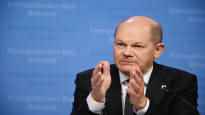Russia’s threat scared Chancellor Olaf Scholz, but the German leader does not seem to take China’s threat seriously, writes European correspondent Suvi Turtiainen.
BERLIN Half a year ago, the Chancellor of Germany Olaf Scholz made a comment that is still being analyzed to understand his Russia policy. Scholz said Der Spiegel (switch to another service) -magazine in April that he will do everything he can to avoid escalation, that there will be no third world war.
– There must not be a nuclear war, Scholz said in the spring, referring to Russia’s major attack and the response to it.
The comment reflects the fear of the Germans. Fresh opinion survey (you will switch to another service) according to 57 percent of Germans fear that Russia will launch a nuclear strike against Ukraine. 37 percent fear that Russia may strike Germany with a nuclear weapon.
The Russian threat scares the Germansbut is Vladimir Putin did the threat of nuclear weapons also scare the chancellor?
The new Der Spiegel, published on Saturday, ponders the matter. According to the newspaper’s sources, at the end of last year, the Russians had talked about nuclear strikes on Berlin and two other targets in Germany as part of the Baltic Sea military exercise.
According to security sources, the Germans had eavesdropped on the Russians’ conversation, which the Russians probably knew. So the nuclear strike talk could have been a deliberate provocation.
Der Spiegel asks if the exercise can still be the reason for Scholz’s spring statement. Was the chancellor scared of the nuclear strike talks in a way that is harmful to Germany and Europe?
In Finnish public discourse, the mantra is that when Russia threatens, one should not be afraid. Fear would only benefit Russia.
In Germany’s leadership, the fear of Russia’s reaction acts as a clear brake – whether Scholz had heard of the nuclear weapons talk of the military exercises or not.
Olaf Scholz does not want to hand over Leopard battle tanks to Ukraine, despite Ukraine’s numerous requests. Germany has armed and aided Ukraine generously, but has drawn the line on battle tanks.
The interpretation has been that sending in battle armor could irritate Russia too much and, at worst, lead to exactly the escalation that Scholz was referring to in his spring comment.
Regarding Russia, Olaf Scholz seems fearful, but Olaf Scholz does not seem to take the threat of China seriously.
Olaf Scholz this week allowed the partial sale of Hamburg’s port terminal to the Chinese company Cosco, even though the ports are part of critical infrastructure.
Six German ministries and the German security authorities were responsible for the deal. The fear is that an authoritarian China can use the ownership of a Chinese company as a means of political pressure and get too much information about a port that is important for all of Europe.
Despite the opposition of his ministers, Scholz decided to allow the trade and accepted the compromise proposal. Instead of 35 percent, Cosco will be sold 24.9 percent of one terminal, and the company’s influence in the company will be limited.
Before moving to federal politics, Scholz served as the mayor of Hamburg and even then had close contacts with China. From the point of view of the city of Hamburg, the trade was important.
Now, however, Scholz is a significant leader of a significant European state. The decision to allow the trades seemed to ignore Europe’s common interests.
Chinese companies have other port ownerships in Europe. However, it is a different matter to sell a share of the terminal right now, when both Germany and the EU are trying to reduce their strategic dependence on China.
The big attack started by Russia and the energy war that followed taught us how dangerous dependence on authoritarian countries can be. China is Germany’s most important trade partner and the German car industry has large investments in the Chinese market.
Outwardly, it appears that Scholz consciously acted against the European common line in port trades. The chancellor’s way of acting is already a significant reputational disadvantage for Germany.
Scholz’s reputation as a spineless – or banknote backbone – manager is confirmed by the timing of the terminal trade.
The Chancellor will travel to China next week to meet the president Xi Jinpingwho strengthened his power even more at the party meeting a week ago.
For Xi, the visit is a PR win. For Scholz, it could be a disaster: the whole of Europe is watching how the German leader fares as a guest of an authoritarian host.
The German government approved the partial sale of the port terminal to China – security authorities and the Ministry of Defense opposed the deal
